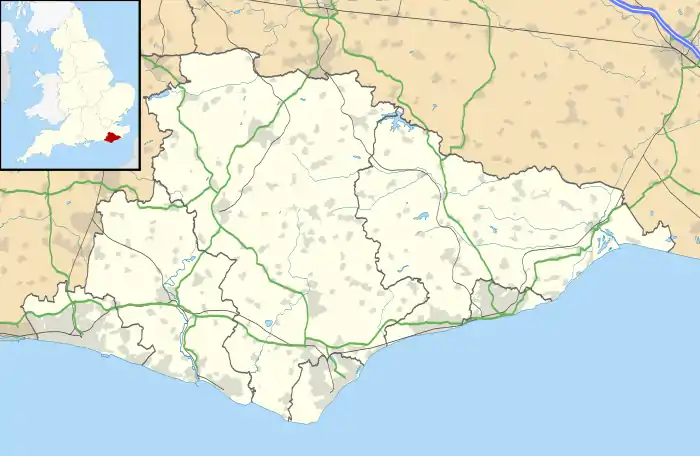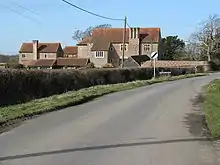Chiddingly
Chiddingly (/ˈtʃɪdɪŋlaɪ/ CHID-ing-lye) is an English village and civil parish in the Wealden District of the administrative county of East Sussex, within historic Sussex, some five miles (8 km) northwest of Hailsham.
| Chiddingly | |
|---|---|
 Chiddingly Location within East Sussex | |
| Area | 17.6 km2 (6.8 sq mi) [1] |
| Population | 1,247 (Parish-2011) [2] |
| • Density | 148/sq mi (57/km2) |
| OS grid reference | TQ543142 |
| • London | 43 miles (69 km) NNW |
| District | |
| Shire county | |
| Region | |
| Country | England |
| Sovereign state | United Kingdom |
| Post town | LEWES |
| Postcode district | BN8 |
| Post town | HAILSHAM |
| Postcode district | BN27 |
| Dialling code | 01825 |
| Police | Sussex |
| Fire | East Sussex |
| Ambulance | South East Coast |
| UK Parliament | |
| Website | http://www.chiddingly.gov.uk/ |
The parish is rural in character: it includes the village of Chiddingly and a collection of hamlets: the largest of these being Muddles Green and Thunder's Hill; others being Gun Hill, Whitesmith, Holmes Hill, Golden Cross, Broomham and Upper Dicker.[3] It covers 7 square miles (18 km2) of countryside. Of the more than 340 dwellings in the parish, over fifty have the word "Farm" in their postal address.
Geography
The parish is in the Low Weald. Like Rome, it is founded upon seven hills: Thunders Hill; Gun Hill; Pick Hill; Stone Hill; Scrapers Hill; Burgh Hill and Holmes Hill,[4] the latter being on the A22 road in the south of the parish. Tributaries of the River Cuckmere flow both north and south of the village.
Governance
Chiddingly is part of the electoral ward called Chiddingly and East Hoathly. The population of this ward taken at the 2011 Census was 3,220.[5]
History
The presence of low-grade iron ore in the local sandstone supported Roman mining and smelting in the area.
The Domesday Book of 1086 refers to Cetelingei: the final -ly of the name shows it to have had Saxon origins. The "Chiddingly Boar", found in 1999, was apparently a silver hat badge of a supporter of Richard III, probably lost or discarded in the 1480s; it is now in the British Museum[6] There is a large number of manorial buildings in the parish, including Chiddingly Place, rebuilt c 1574[7] Sir John Jefferay, Chief Baron of the Exchequer in 1577; scattered remnants of its E-shaped wings remain, as the east wing, later called "The Chapel/Chapel Barn" now known as 'Jefferay House', and sections of the main range west of the demolished Great Hall.[8]
Points of interest

Burgh Hill Farm Meadow is a Site of Special Scientific Interest (SSSI) within the parish.[9] This is a hedgerow-surrounded meadow of an uncommon grassland type.
The Church of England parish church at Chiddingly is of unknown date and dedication, but references to it occur from the 13th century.[10] Today the parish is part of a united benefice with the neighbouring parish of East Hoathly. A Congregational chapel was founded in Chiddingly in 1901.
Chiddingly has a primary school.[11]
The annual Chiddingly Festival includes various entertainments around the village.[12] Chiddingly had four public houses: The Six Bells Inn in the village, The Gun Inn, The Golden Cross Inn (which closed in 2015 and has now been converted to flats), and The Inn on the Park at Golden Cross. Chiddingly has a village hall.
Chiddingly also has a museum and archive.[13] The Farley Farm House gallery features the lives and work of Roland Penrose and Lee Miller and is open for guided tours on pre-determined days.
Stone Hill is a well preserved 600 year old Tudor style farm house with large park garden. In the early 20th century, the house was owned by J.M. Barrie, author of Peter Pan, who lived here until 1934. In the 1970s/1980s the property was owned by composer and pianist Keith Emerson (founder of The Nice and Emerson, Lake & Palmer), who lived here with his family. At his Steinway piano in the barn he composed famous music pieces, such as Karn Evil 9 and Piano Concerto No.1.
In 1971 the film director Philip Trevelyan made the documentary film The Moon and the Sledgehammer[14] about the Page family who lived in a wood outside the village and operated two traction engines: an Allchin[15] and a Fowler.
References
- "East Sussex in Figures". East Sussex County Council. Retrieved 26 April 2008.
- "Civil Parish population 2011". Retrieved 8 October 2015.
- "Map showing location of Chiddingly". Archived from the original on 24 January 2008. Retrieved 6 April 2008.
- "Parochial history of Chiddingly". Archived from the original on 22 July 2012. Retrieved 6 April 2008.
- "Chiddingly and East Hoathly ward population 2011". Retrieved 8 October 2015.
- British Museum: The Chiddingly Boar".
- A date formerly in stained glass of the Great Hall, noted by Mark Antony Lower, Parochial history of Chiddingly :22.
- Mark Antony Lower, Parochial history of Chiddingly 1862:21ff; a A watercolor view of the north front in 1783 is in the British Library..
- "Natural England - SSSI". English Nature. Archived from the original on 25 May 2011. Retrieved 29 May 2008.
- Chiddingly parish church
- Chiddingly Primary School Archived January 22, 2005, at the Wayback Machine
- Chiddingly Festival
- Farley Farm House official site
- The Moon and the Sledgehammer official website
- Allchin Files about Wm. Allchin traction engines Archived March 2, 2009, at the Wayback Machine
 Chiddingly Church
Chiddingly Church Chiddingly Church
Chiddingly Church Dicker Mill House, Golden Cross
Dicker Mill House, Golden Cross Golden Cross Inn, Golden Cross
Golden Cross Inn, Golden Cross Stone Hill
Stone Hill
External links
- Chiddingly at Curlie
 Media related to Chiddingly at Wikimedia Commons
Media related to Chiddingly at Wikimedia Commons
